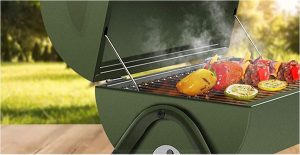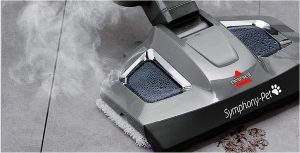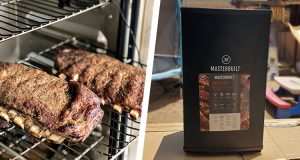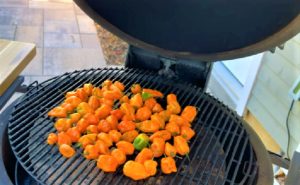Blackstone Griddle Rusted and Peeling! What to Do?
Blackstone griddle rusted and peeling is a common issue faced by many users. This problem is often caused by improper care and maintenance.
A Blackstone griddle, like any other cooking equipment, requires regular care to maintain its pristine condition. Over time, neglect can lead to issues such as rusting and peeling. This is especially true if the griddle is getting very old. One of the main culprits behind a Blackstone griddle rusting is the lack of proper cleaning after use. Rust can also appear if the griddle’s paint starts to peel, be it on the hood or the top.
To address the rust issue, there are several methods available. One can find a grill stone specifically designed for griddles. Alternatively, using steel wool or medium-grit wet-or-dry sandpaper can be effective for rust removal and cleaning.
If you notice the Blackstone flaking, it’s a sign that the seasoning is peeling off. This can be fixed by re-seasoning the griddle.
For those who’ve received a Blackstone griddle that came rusted or are looking to recover a rusted one, there are specialized rust cleaners available in the market.
These products are formulated to tackle rust problems and restore the griddle to its former glory. Remember, with the right care and attention, you can extend the life of your Blackstone griddle and enjoy many more delicious meals.
why does the Blackstone griddle keep rusting
Blackstone griddles, while popular and efficient, can sometimes face the challenge of rusting.
The primary culprit behind this is moisture. Even a tiny droplet of water, if left unchecked, can initiate the rusting process. This is especially true if the griddle isn’t dried thoroughly after cleaning.
Storing the griddle in places with high humidity or without a protective cover can further exacerbate the rusting.
Another factor is the seasoning of the griddle. A compromised seasoning layer can expose the metal, making it more prone to rust.
Signs your Blackstone griddle is rusting
Being vigilant about the condition of your Blackstone griddle can prevent long-term damage.
One of the most evident signs of rust is a distinct change in color. You might notice brownish-red patches forming on the surface. As time progresses, these patches can expand, leading to a roughened griddle surface.
Another subtle hint is the compromised seasoning layer. If food starts sticking more than it usually does or there’s a peculiar taste to your dishes, it might be an indication of rust affecting the seasoning.
Learn More: Paint Peeling in the Microwave! Is It Safe to Use?
what to do if your Blackstone griddle rust
Encountering rust on your Blackstone griddle isn’t a cause for panic. Begin by targeting the rusted regions using a grill stone or medium grit sandpaper.
After successfully removing the rust, ensure you clean the griddle meticulously. Once cleaned, drying it is crucial. The next step is to re-season the griddle, which acts as a protective barrier.
Adopting a routine of consistent maintenance, thorough cleaning, and proper storage can deter the onset of rust in the future.

how to remove rust from blackstone griddle
Blackstone griddles are renowned for their durability and performance, but like all metal surfaces, they can develop rust over time. Proper care and maintenance can prevent this, but if rust does appear, it’s essential to address it promptly to ensure the griddle remains in optimal condition. Here are some effective methods to remove rust from a Blackstone griddle:
1. Vinegar and Baking Soda Solution
Vinegar, with its acidic properties, can break down rust. Mix equal parts of vinegar and baking soda to form a paste. Apply this mixture to the rusted areas and let it sit for 20-30 minutes.
Using a scrubbing pad, gently scrub the surface. The rust should lift off, leaving the griddle clean. After scrubbing, rinse the griddle thoroughly and dry it completely.
2. Lemon and Salt Method
Lemon juice, being acidic, can effectively combat rust. Sprinkle salt over the rusted areas and then squeeze lemon juice over the salt. Allow it to sit for a couple of hours.
The combination will loosen the rust, making it easier to scrub away. Use the lemon rind or a scrubbing pad to scrub the surface. Once done, rinse and dry the griddle.
3. Potato and Dish Soap Technique
Potatoes contain oxalic acid, which can dissolve rust. Cut a potato in half and dip the cut end in dish soap. Rub the potato over the rusted areas. The soap will help in lubricating while the potato’s oxalic acid works on the rust.
After a few minutes of scrubbing, rinse the griddle and dry it thoroughly.
4. Commercial Rust Removers
For stubborn rust, commercial rust removers can be an effective solution. Always choose a product that’s safe for cooking surfaces. Apply the remover as per the manufacturer’s instructions, ensuring you wear gloves for protection.
After treating the griddle with the remover, rinse it well and ensure it’s dried properly.
Guarding Blackstone Griddle Against Rust
A Blackstone griddle’s lifespan and efficiency are often determined by its upkeep. The primary adversary here is moisture, which can instigate rust.
To combat this, it’s imperative to ensure the griddle is bone dry after each cleaning session. Employing a protective cover, particularly in damp environments, can act as a barrier against potential moisture threats.
Seasoning the griddle at regular intervals is also crucial. A well-seasoned surface not only elevates the culinary experience but also fortifies the griddle against rust.
Tackling a Peeling Blackstone Griddle
A peeling surface usually signals a deteriorating seasoning layer on the griddle. The first step in addressing this is a thorough cleaning to rid the surface of any loose fragments.
Following this, a fresh seasoning session can rejuvenate its non-stick attributes and offer protection. Periodic inspections for signs of wear can facilitate early detection and timely action.

Missteps Causing Blackstone Griddle Rust
Certain inadvertent actions can pave the way for rust. A frequent oversight is leaving the griddle damp post-cleaning. Storing it in moisture-rich environments without its protective sheath is another.
Resorting to abrasive cleaning agents or tools can also erode the seasoning, rendering the metal susceptible.
Mastering Blackstone Griddle Seasoning
Seasoning is akin to bestowing a protective armor on the griddle. It involves coating the surface with a layer of oil and heating it to a point where it forms a protective seal.
This not only wards off rust but also crafts a non-stick cooking canvas. For effective seasoning, spread a slender layer of high smoke point oil, such as flaxseed or canola, and heat until it reaches its smoking point.
Reiterating this process several times will result in a lustrous, protective layer. Regular seasoning rituals ensure the griddle remains primed for gastronomic adventures.
Frequently Asked Queries on Blackstone Griddle Issues
Is Moisture the Only Cause of Rust on Blackstone Griddles?
While moisture is a primary factor, other elements like salt, acidic food residues, and chemicals can also contribute to rust formation. Proper cleaning and storage minimize these risks.
Can I Use Any Oil for Seasoning My Griddle?
It’s best to use oils with a high smoke point like flaxseed, canola, or vegetable oil. These oils create a more durable protective layer.
Does Cooking Acidic Foods Cause Peeling?
Yes, cooking acidic foods like tomatoes can break down the seasoning layer, leading to peeling over time.
Is It Safe to Cook on a Slightly Rusted Griddle?
While a minor rust spot might not be immediately harmful, it’s best to address and remove rust before cooking to ensure food safety and taste.
How Often Should I Check My Griddle for Rust or Peeling?
Regular inspections, especially after cleaning or prolonged storage, can help detect early signs of rust or peeling.
Can I Prevent Rust by Keeping the Griddle Indoors?
Storing indoors can reduce exposure to moisture, but it’s also essential to ensure the griddle is clean and dry before storage.
Do Protective Covers Guarantee No Rust Formation?
While covers significantly reduce moisture exposure, they don’t guarantee complete prevention. Regular maintenance and seasoning are also crucial.
The Last Word
Caring for a Blackstone griddle requires vigilance and regular maintenance. Addressing issues like rust and peeling promptly ensures the longevity of the griddle and the quality of the food cooked on it. By adopting preventive measures, using the right products for cleaning and seasoning, and storing the griddle properly, one can enjoy countless delightful culinary experiences. Regular checks and timely interventions can keep the griddle in prime condition, ready for any cooking adventure.





